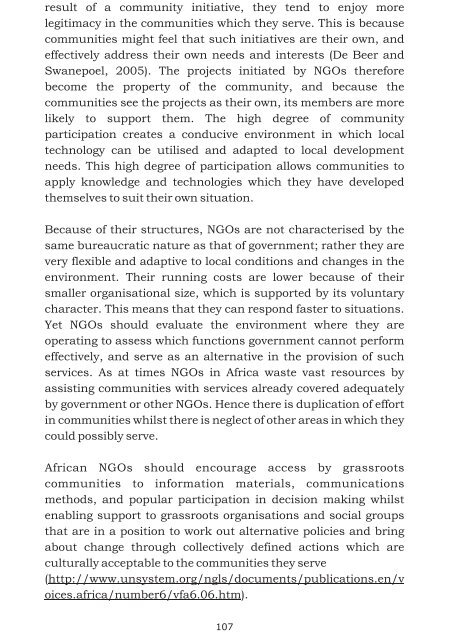Beneficiaries are actors too.pdf - Southern Institute of Peace ...
Beneficiaries are actors too.pdf - Southern Institute of Peace ...
Beneficiaries are actors too.pdf - Southern Institute of Peace ...
Create successful ePaper yourself
Turn your PDF publications into a flip-book with our unique Google optimized e-Paper software.
esult <strong>of</strong> a community initiative, they tend to enjoy more<br />
legitimacy in the communities which they serve. This is because<br />
communities might feel that such initiatives <strong>are</strong> their own, and<br />
effectively address their own needs and interests (De Beer and<br />
Swanepoel, 2005). The projects initiated by NGOs therefore<br />
become the property <strong>of</strong> the community, and because the<br />
communities see the projects as their own, its members <strong>are</strong> more<br />
likely to support them. The high degree <strong>of</strong> community<br />
participation creates a conducive environment in which local<br />
technology can be utilised and adapted to local development<br />
needs. This high degree <strong>of</strong> participation allows communities to<br />
apply knowledge and technologies which they have developed<br />
themselves to suit their own situation.<br />
Because <strong>of</strong> their structures, NGOs <strong>are</strong> not characterised by the<br />
same bureaucratic nature as that <strong>of</strong> government; rather they <strong>are</strong><br />
very flexible and adaptive to local conditions and changes in the<br />
environment. Their running costs <strong>are</strong> lower because <strong>of</strong> their<br />
smaller organisational size, which is supported by its voluntary<br />
character. This means that they can respond faster to situations.<br />
Yet NGOs should evaluate the environment where they <strong>are</strong><br />
operating to assess which functions government cannot perform<br />
effectively, and serve as an alternative in the provision <strong>of</strong> such<br />
services. As at times NGOs in Africa waste vast resources by<br />
assisting communities with services already covered adequately<br />
by government or other NGOs. Hence there is duplication <strong>of</strong> effort<br />
in communities whilst there is neglect <strong>of</strong> other <strong>are</strong>as in which they<br />
could possibly serve.<br />
African NGOs should encourage access by grassroots<br />
communities to information materials, communications<br />
methods, and popular participation in decision making whilst<br />
enabling support to grassroots organisations and social groups<br />
that <strong>are</strong> in a position to work out alternative policies and bring<br />
about change through collectively defined actions which <strong>are</strong><br />
culturally acceptable to the communities they serve<br />
( http://www.unsystem.org/ngls/documents/publications.en/v<br />
oices.africa/number6/vfa6.06.htm).<br />
107


